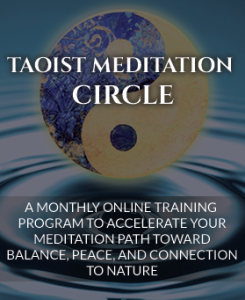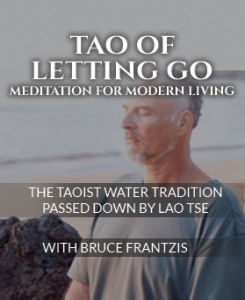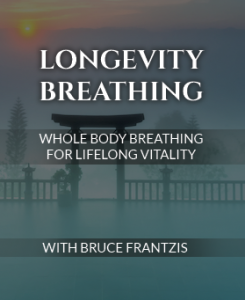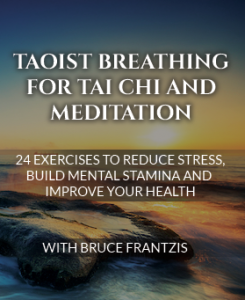Eight Principles of Laozi’s water tradition
The following eight principles are fundamental to Taoist sexual qigong and meditation; they lie at the core of Laozi’s (Lao Tzu’s) Water tradition. A complete treatise on these and other important relevant principles would take a whole volume, not just a chapter, but you will find all of these principles flow through the knowledge and practices presented in this book.
- Naturalness
The Chinese word zi ran has many meanings, but most commonly refers to nature or naturalness. Da zi ran, or great nature, is another expression for “ Tao.” Rather than letting sex be natural, it is tempting to frame it as something that is either sacred or profane. To Taoists, sex may be either, neither or both. In fact, from the viewpoint of spiritual evolution, neither an abundance of sexual need and desire nor a complete lack of it is relevant. Sex is a natural part of human nature.
In the chapters that follow, sexuality is discussed in energetic terms, always moving in the direction of harnessing it as a vehicle for pure spirituality. Spirituality, in this sense, goes beyond rigid belief or rejection of belief and instead seeks to release, resolve and transcend the blocked and limited forces in an individual. Taoism asserts neither that there is nor that there is not an absolute and proper way of doing anything.
Natural Breath
When ordinary sex continues over a long time and two people begin to bond, something special begins to emerge during sex that Taoists refer to as natural breath. Natural breath enables energy channels to open naturally and easily, without conscious attempt. This happens spontaneously when the connection between two people has developed sufficiently.
As couples grow more and more in synch with each other, they can calibrate to this natural breath with a light kiss, by holding hands, or simply being in each other’s presence. Primal and instinctive, natural breath is one of the principal bonding mechanisms that keeps a couple together for thirty, forty or fifty years and more. Through all of life’s trials and tribulations, through periods where sex is exciting, frustrating or altogether absent, the natural breath is a consistent bonding agent.
Natural breath does not necessarily mean that the lovers have synchronized breathing, just that there is a subtle connection on various levels. Nothing is more soothing when you are in a ragged, unsettling mood than climbing into your partner’s arms. At the physical level, this is due, in part, to the calming effect of natural breath. This is a gift that people can bring to one another: a rock-solid sense of stability.
The more natural breath is activated, the more the energy channels remember the smooth, connected feeling. When this happens it is easier to remember and maintain this connection. Sexual qigong allows natural breath to be turned on more quickly between couples than does ordinary sex.
Naturalness is the goal. With regard to sexuality, this means being natural, comfortable and at ease in all phases of sexuality. Let the flow be natural from the initial meeting of a lover to foreplay and all the way to orgasm. In this spirit, neither attempt nor engage in games to manipulate the other. Leave aside any cookbook approaches. Instead, focus on what arises naturally from the energy that spontaneously is present between friends and lovers.
- Internal Balance
The cornerstone of Taoist sexuality is the ability to attain internal balance— something often desperately sought in today’s frenetic world. Internal balance is an essential factor to living a satisfying life. Sex should make a couple feel smooth inside, both in the midst of sexual play and more importantly for a lingering period afterward. Developing internal balance is the key for being able to have longer and more stable relationships. When sex does not create internal balance, the erratic, jangled afterglow diminishes the possibility of both partners wanting to stay bonded either as platonic friends or lovers.
- Relaxation
The entire Water tradition emphasizes relaxation at all levels of human experience. Beyond relaxing your muscles and nerves, its methods help you relax into the deepest substructures of your anatomy. Energetically, Laozi’s Water tradition systematically teaches you to relax the energy that allows your physical body, emotions, thoughts and hidden psychic capacities to smoothly function. Relaxing your Being or soul is also exceptionally important in the Water tradition. Spiritual relaxation initially results from letting go of both your own and your partner’s energetic blockages in all seven energy bodies, something that is infinitely easier if both lovers do the practices together.
In each moment, the Outer and Inner Dissolving practices enable you and your partner to energetically let go so that both become more natural and relaxed. The more relaxed you are on every level, from the physical to the psychic, the better the sex you can have. Integrate relaxation in all stages of sex. Relax ever more deeply as foreplay continues. Let the ever-increasing relaxation of sexual, emotional or mental foreplay lead you gradually into intercourse. During and after orgasm, continue to melt into even greater states of relaxation.
- Making Your Body Conscious
The Taoist tradition is one of the few that truly brings people fully into their body. Relaxation is prerequisite to make a body fully conscious. Full consciousness is not possible when the body is tense. Practices like Taoist breathing, qigong and tai chi are meant to strengthen the human nervous system and prepare the body for higher spiritual work. Taoist practices teach you how to focus your full attention inside your body until it wakes up and feels alive, not as an imagined visualization, but as a felt reality.
In Slow Sex, Nicole Daedone advocates that “we learn to shift our focus from thinking to feeling, from a goal orientation to an experience orientation” and replace the idea of a fast and hard approach to sex with being slower and more connected. To make your body conscious, you have to drop your mental energy lower into your body. Only then can you fully connect with your body and heart.
The Taoist methods that develop internal feeling, derived from the Water tradition of Laozi, concentrate on allowing, following and working with the energies that already exist in your body in each instant of time. The practices teach you to think less and feel more. To feel good, it is necessary to activate your feeling part first. When you feel an exciting physical or emotional sensation, peel away the many layers. Savor the moment, linger, feel deeper and consciously experience all that you can with each step of the sexual journey. By taking the time for your awareness to penetrate your own body and receive the sensations from your partner, feeling good can take on meanings you have never even imagined.
- Seventy Percent: Do Neither too Much nor too Little
All Taoist qi practices from the original Water tradition of Laozi incorporate the principle of moderation, which can be described as the “seventy-percent rule.” Lacking the seventy-percent rule you can never fully relax.
The rule states that you should only do a practice or technique to seventy percent of your capacity. Striving for one hundred percent produces excess tension and stress that causes the body to tense up or shut down, without you necessarily being consciously aware that this is happening. You can apply the seventy-percent rule to all your practices, comfortably using your full effort without strain.
In his classic book, Introduction to Tantra, Lama Yeshe emphasizes the importance of moderation and abandoning unreasonable expectations, “Realize that expectations are a hindrance and let go of them as soon as they arise.” He adds, “Sometimes we put too much energy into our practice … thinking that this will bring us more quickly to our realizations. But too much effort often has the opposite effect; it prevents our progress instead of helping it.”
In this modern era, people are led to believe that by straining, they will progress faster and further. Most people do not want moderation; they want excess. However, if you always push your energy to one hundred percent, you will never allow your nerves, muscles and mind to relax, which is necessary for you to be able to progress efficiently, without producing unnecessary stress or burnout. The seventy-percent rule and relaxation are inexorably linked.
This is especially true when sexual practices are involved, because they create a high energetic output that can result in a large amount of internal resistance within one or both partners. Moreover, one of the partners may be sexually less responsive, a sign of internal weakness at some energetic level.
The seventy-percent limit can differ widely from one person to another. For this reason both partners need to be very aware of where the thresholds and boundaries are in themselves and their partners, so that the stronger partner never pushes beyond seventy percent of the limits of the weaker partner. For best effect, gear the seventy percent limit to the sexually less-responsive partner or the partner who gets overexcited significantly more rapidly. When your partner is in pain or injured, whether physically or emotionally, he or she should not be pushed to more than fifty percent of his or her capacity.
At any stage of foreplay or intercourse, the human capacity to experience extreme sensation has a limit, call it one hundred percent. When this limit is reached or exceeded then it reverses. In the middle of the sexual act when this happens, one or both partners may begin to lose sensation, become overloaded, go numb, begin to drift or turn off, without necessarily knowing why. When you reach seventy percent on the way toward the hundred-percent limit, regardless of the potential to lead into the sheer pleasure of orgasm, retreat from what you are doing, shift your sexual attention, or just take a rest and hug until your nervous systems recover.
Then begin again. This takes time to learn because most people in the West lack sensitivity to know when they are at seventy-percent and have been trained since childhood to always push their limits.
After both partners have trained sufficiently and are smooth, natural and relaxed at the seventy-percent level, they can then adjust to use an eighty-percent boundary.
- Letting Go
There are two primary ways of implementing any philosophy, energetic or spiritual, to influence the forces of nature within you—either through exerting control or by letting go. A metaphor for this is the way that a great statue can emerge from a huge piece of marble. In the way of control, the artist creates a vision of what he wants it to look like in the end. The artist draws up clear plans with all desired specifications according to his vision. Next the plans are precisely executed; each detail is controlled perfectly; and from this you get a statue. This is the way of Fire and control.
The Water tradition takes a different approach, the way of letting go. The artist places the big piece of marble in the studio, looks at it and observes it while letting go of any idea of what the rock should become. The artist waits and merges his or her energy field with the rock’s energy field. The rock then tells the artist what has to be let go of and chiseled away. The statue thus emerges from the nature of the combined energy of the rock and the artist. The artist becomes the agent through which the flow of manifestation moves.
In the end, the artist is delighted and surprised at the content of the art that emerges. The outcome required that the artist get out of the way and let go of any need to control the process. He or she just had to choose to be a part of it.
As Sogyal Rinpoche so eloquently explains in, The Tibetan Book of Living and Dying, “Although we have been made to believe that if we let go we will end up with nothing, life itself reveals again and again the opposite: that letting go is the path to real freedom.”
The Inner and Outer Dissolving meditation methods are the primary methods by which letting go is accomplished within the Taoist Water tradition. You recognize what is tense or dysfunctional inside and then let it go.
- Wu So Hui and You So Hui
Two commonly used Chinese phrases central to the Taoist approach to morality are wu so hui and you so hui. These two phrases lie at the core of how Taoists decide to implement any moral or philosophical principle in life.
Wu so hui means “the small stuff”; “it’s neither here nor there”; “it’s okay if you do or don’t.” Often these are the thousands of small decisions a person makes each day. You so hui considers what is critically important, essential to living. This is the big stuff that really matters.
Taoists generally view most of the choices we make about life’s daily events as wu so hui. If you use “no harm, no foul” as a general principle, your choices probably won’t carry a lot of moral implications. On the level of ordinary sex between consenting adults, the choices generally can be called wu so hui. Likewise, if you have three or four things you feel, want or need to practice and there is no compelling reason to especially focus on one or the other, it’s probably wu so hui, really not so important.
From the Taoist spiritual perspective generally, that which positively or negatively affects the events of your life on this earth, but will not create karma nor follow and potentially control you in future lives, is spiritually wu so hui. This is important to address with care, but it is not critical.
Often, what causes stress in many people’s lives is that their mind becomes filled with things that don’t matter much creating discord and disharmony. It is wise to look at all you hold in your mind to sort between what matters and what does not. Then you can consciously direct your attention to the things that matter and that you can influence.
When something is deeply gnawing your guts, has repetitively gotten in the way of health, emotional or sexual relationships, it’s you so hui. If it can damage you and negatively condition your spirit not only in this life but potentially afterward, then it’s you so hui. Likewise, compassion is generally you so hui, but how it’s implemented and taken on the road is generally wu so hui and to be determined by the confluence of real time variables surrounding the point, the object of the compassion.
Whatever your culture or religion, looking at your choices in life from the perspective of these two phrases is an interesting and practical method for consciously examining them, particularly in terms of sexuality. It’s another tool for accessing your awareness.
- When the False Leaves, Only the True Remains
As you make your body more conscious, you become more able to see what is inside. This brings us to the principle of “When the False Leaves, Only the True Remains.” Once you start to see what is inside you and apply dissolving meditation practices, then, as your blockages resolve, you will be left only with what is true.
Dissolving blockages will enable you to let go of layer after layer of falsehoods. These layers are what Taoists call “red dust” and what Buddhists call “samsara” or “clouds that obscure the sky.” Without these false layers, it becomes much easier to see what is true in all times and places. By ridding yourself of all that is false, you will arrive at your true nature and the Tao. Likewise, if you arrive at your nature there can be nothing that is false.
These eight principles have no hierarchy. All Taoist practices and principles each flow into the other. Like life itself, each principle or qi practice in Taoism should seamlessly flow into and integrate with the others.
Laozi’s Meditation Tradition
There are many different methods of meditation. The Taoist meditation path from the Water tradition of Laozi is one of feeling, using energy, letting go and openness. Many have read the words of this tradition in books like the Tao Te Ching, the Book of Zhuangzi and the I Ching. Although the words ring true, the practical meditation methods behind the words in these books may seem vague and hidden. However, the author’s training as a Taoist priest and with Lineage Master Liu enabled him to understand the living meditation tradition described in those texts.
Four Practice areas in Taoist Meditation
Laozi’s Water method of meditation includes four key areas of focus.
I. Making Your Body Conscious
The first emphasis is to become conscious in your body and the energies inside you and, most importantly, to become present to the awareness of awareness itself which can enable you to recognize the subtleties of your deeper levels of energy. Most people are unaware of the deeper levels within, but these energies are always simultaneously very alive and active inside you, whether you recognize them or not. Taoist breathing, qigong and tai chi are meant to bring your consciousness fully into your body so you can then work with what you discover inside yourself during meditation. These practices also naturally make your body healthy and strong so you develop the stamina required to practice Taoist meditation.
II. Understanding Your Conditioning and Morality
The second area of practice is to understand your conditioning and morality. Without understanding morality, virtually everyone will be controlled by his or her karma. Taoism holds that every meditator needs to delve inside and personally discover the roots of the morality he or she is willing to live life by. You do this by looking at aspects of any conceivable kind of moral and ethical issue that could happen to you or to anyone else, in terms of how to pursue a course of action, the potential ways the issue can affect your deepest unconscious mechanisms, how it will color the experience of all that transpires in life and how it might affect others.
Most importantly, truly understanding morality and ethics means you can observe how all the little moral pieces join and interconnect—including you, others and various situations taking into account both content and context. In Taoist meditation, developing your own authentic moral and ethical bedrock can spring only from heightened awareness.
Central to all this is the guiding principle that there are no absolutes, because what seems simple on the surface may or may not be extremely complex underneath. Thus, what may initially seem to be kind or cruel may, when seen from a larger, free and uncontracted space, be quite different.
To truly engage with this significant task of investigating morality requires developing a larger amount of awareness and clarity. To do this and embody enough of both, the meditator first ponders and looks at a wide variety of moral issues from multiple levels. Then you sit, meditate and release some or all of your personal conflicts and conditioning that prevent you from recognizing and releasing your internal numbness. The goal is that in the end you can be truly morally present in whatever situation life gives you.
III. Recognizing and Resolving Your Blockages
The third emphasis of practice is to recognize where you are currently stuck or blocked, then let go of those blockages and become free. You let what is closed, paralyzed and contracted become internally open and spacious. This is the road of emptiness, resolving your own personal blockages at every level of your being and in all your energy bodies.
IV. Finding the Unchanging Still Point
Lastly, the meditator’s aim is to find the vibrant, still point beyond time and change. You engage with it on all levels, both in quiet meditation and during all the active roles played in life in all its infinite variations. You do this until you find your true essence—the energy body of individuality that is beyond your personality, personal history and all intellectual knowledge.
When you reach this stage, the work of Taoist inner alchemy begins. Internal alchemy seeks through advanced meditation and certain mind-body-spirit practices to:
- Work with the consciousness of an individual in order to become aware of the cellular vibratory energetic level of the body to heal every form of disease.
- Raise, bring out, and change normally hidden qualities and capacities of the body-mind.
- Elevate ordinary consciousness to higher and more refined levels of super- consciousness until the mind expands to encompass the whole of the universe.
Through Taoist inner alchemy, you take your essence and continuously transform its vibratory essence as you experience many, if not most, of the ways essence can manifest in the universe. When you have enough experience you realize the Tao and become what is referred to in Taoism as a Spiritual Immortal. This is the culmination of all Taoist meditation practice.






0 Comments